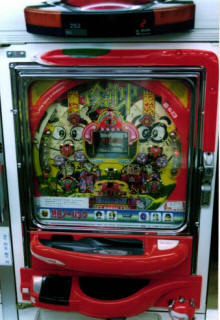Pachinko
From Wiki
Pachinko is a device used for amusement and prizes and is related to pinball machines. Although originally strictly mechanical, modern pachinko machines are a cross between a pinball machine and a video slot machine. Pachinko is said to have been invented sometime after World War II in Nagoya, though the date is sometimes questioned. The machines are widespread in Japan in establishments called "pachinko parlors", which also often feature a small number of slot machines.
 The
player purchases a large number of small steel balls which are inserted, in
bulk, into the machine. Originally, machines had a spring-loaded lever for
shooting the balls individually, but modern machines use a round "throttle"
that merely controls how quickly an electrically fired plunger shoots the
balls onto the playfield. The balls then drop through an array of pins, and
usually simply fall through to the bottom, but occasionally fall into
certain gates which make the machine pay out more balls.
The
player purchases a large number of small steel balls which are inserted, in
bulk, into the machine. Originally, machines had a spring-loaded lever for
shooting the balls individually, but modern machines use a round "throttle"
that merely controls how quickly an electrically fired plunger shoots the
balls onto the playfield. The balls then drop through an array of pins, and
usually simply fall through to the bottom, but occasionally fall into
certain gates which make the machine pay out more balls.
Most current machines include a slot machine (these are called "pachi-slo"), and the big winnings are ultimately paid not from the balls falling into gates, but from the slot machine matches that follow. In many modern machines the balls have nothing to do with determining winnings, which are based strictly on electronic random number generators.
The winnings are in the form of more balls, which the player may either use to keep playing, or exchange for tokens or prizes such as pens or cigarette lighters. Under Japanese law, cash cannot be paid out, but there is virtually always a small exchange centre located nearby (or sometimes in a separate room from the game parlor itself) where players can conveniently exchange tokens for prizes for cash. Such pseudo-cash gambling is theoretically illegal but from the sheer number of pachinko parlors in Japan it is clear that the activity is at least tacitly tolerated by the authorities.
As a quasi-gambling activity, pachinko is widely held to have links to organized crime (specifically the Yakuza). There have also been links to the government of North Korea, which has allegedly been able to siphon funds from the sizeable population of Pyongyang-aligned ethnic Korean Pachinko Parlor owners in Japan.
Pachinko parlors share the reputation of slot machine dens and casinos the world over—garish decoration, over-the-top architecture, the smell of tobacco, a low hanging haze of cigarette smoke, the constant din of the machines, and blinding levels of illumination to keep players entranced for hours in their games. Pachinko parlors are by far some of the most flamboyant and colorful buildings one can see in Japan.
Japanese Culture and Society Links
Japanese Sports 競技 (スポーツ)
Japanese Food 食品 (しょくひん)
Japanese Pop Culture 文化(ぶんか)
- Hello Kitty Phenomena
- Japanese Anime, Japanese Manga
- Japanese Hair Straightening: All You Ever Wanted to Know
- Japanese Karaoke
- Kawaii
Miscellaneous
- Creating a Japanese Garden Theme
- Keeping and Handling Japanese Inro
- Misconception about Ninja
- Japanese Bonsai
- Japanese Geisha
- Japanese Wedding
- Why Do Japanese Have Long Lifespan?
- Decorate with Japanese Art
Japanese Literature Links
- Haiku Poetry
- Japanese Alphabet
- Japanese Language
- Japanese Pronunciation
- Learning Japanese Kanji
- Tanka Poems
Japanese Art Links